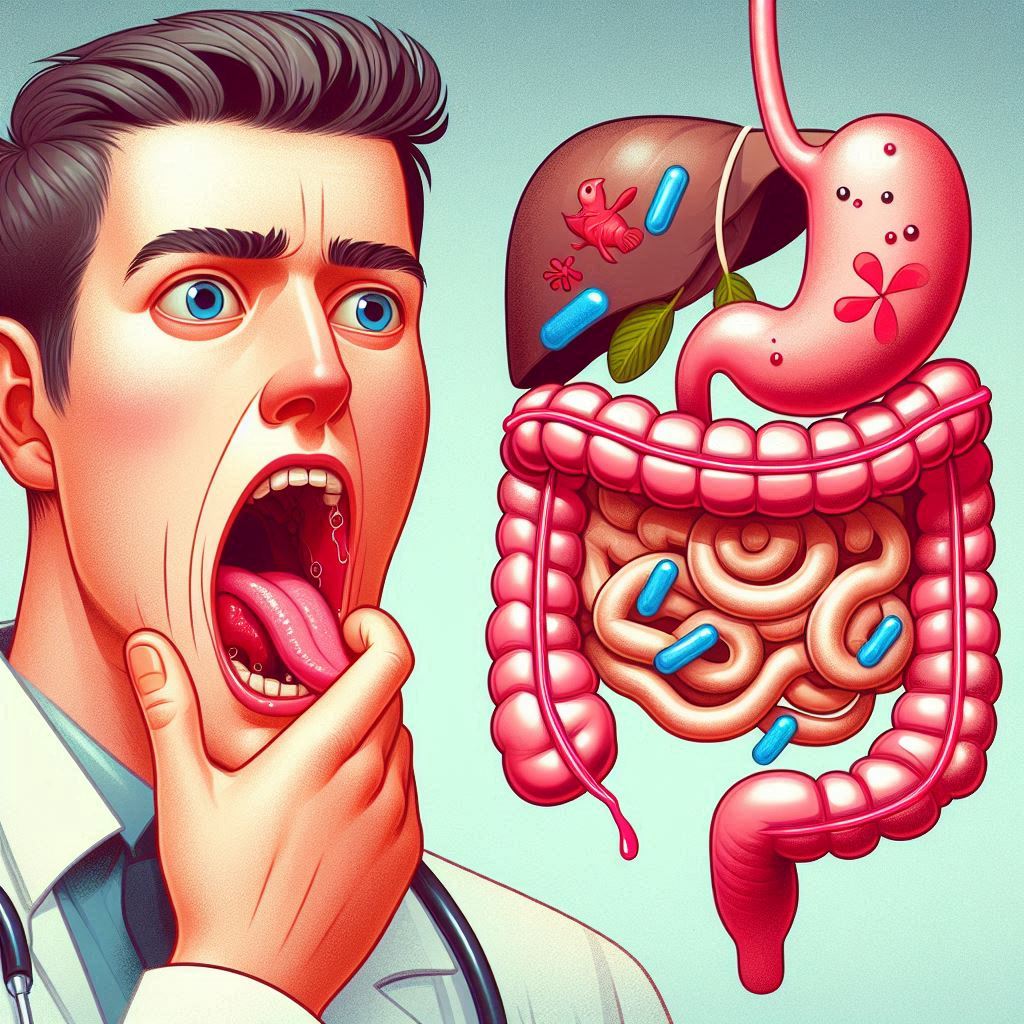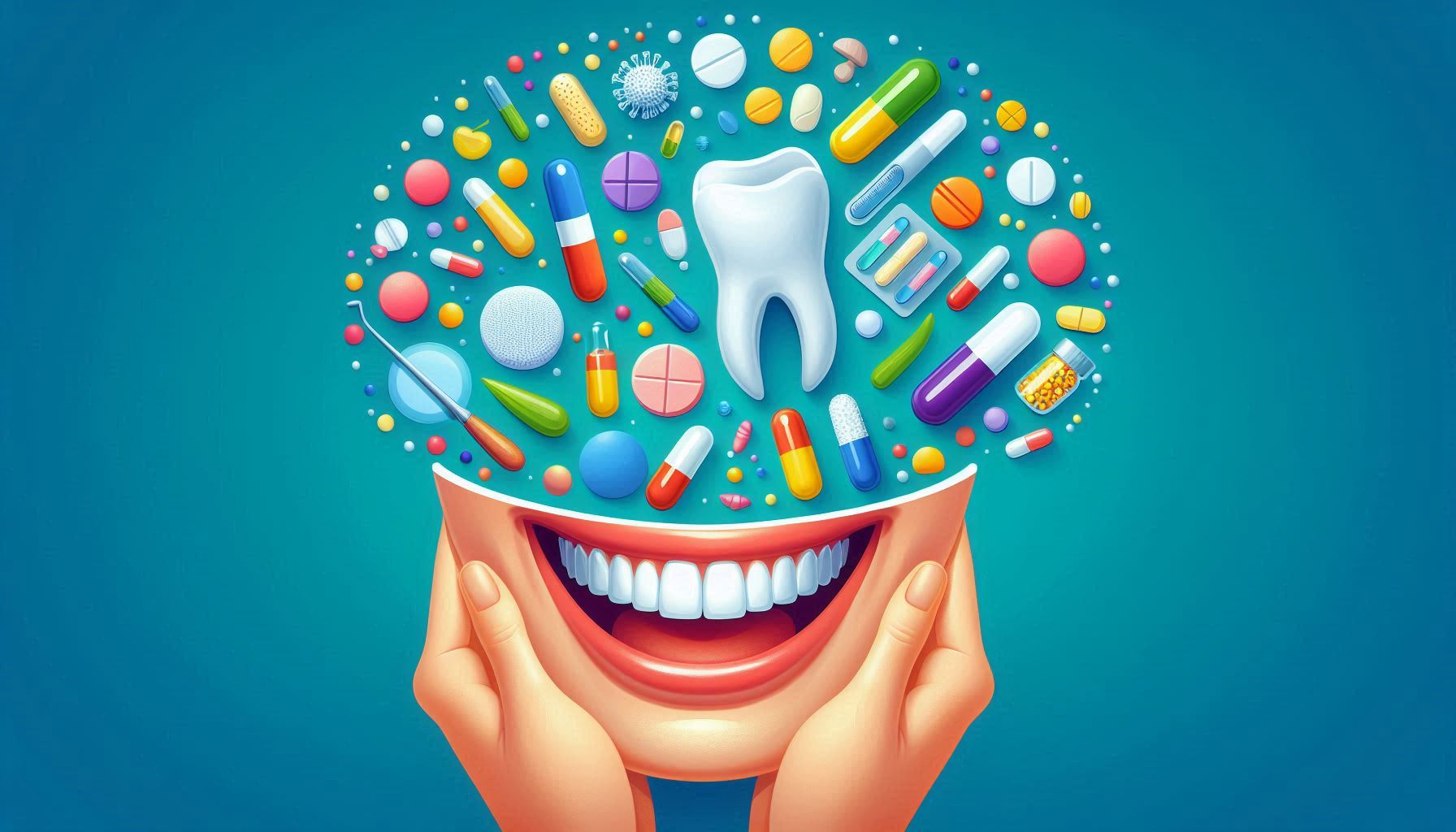Introduction
The old saying “you are what you eat” has a basis in scientific fact. The health of your digestive system, also known as the gut, can significantly influence various other systems in the body, including your mouth. Because the digestive tract begins at the mouth and extends through the esophagus, stomach, and intestines, your oral health can offer valuable clues about what might be going wrong deeper within the digestive system.
Understanding the connection between gut health and oral health can lead to earlier diagnoses of digestive disorders, better treatment approaches, and more effective prevention strategies. If you are experiencing persistent oral issues—bad breath, gum disease, ulcers, or tooth sensitivity—it could be a signal from your gut, the body’s largest immune system organ. With the right awareness, you can use the signs from your mouth to prevent further complications and improve both gut and oral health. In this guide, we will explore how your mouth might be communicating issues in your gut. We will delve into the anatomy and physiology of both the mouth and the gut, how various digestive disorders manifest orally, the role of the gut microbiome, the importance of diet, and the ways to maintain optimal health in both systems.
Anatomy and Physiology of the Mouth and Gut
To understand the connection between the mouth and gut health, it’s important to first look at the physiology and function of both.
The Mouth: More than Just the Entry Point
The mouth, or oral cavity, is the first step in digestion. It’s where food enters the body and is broken down into smaller, more digestible pieces through chewing. Saliva plays a crucial role here by containing enzymes like amylase that begin the breakdown of carbohydrates.
But the mouth is not just a simple entry point. It houses a vast ecosystem of microorganisms that make up the oral microbiome, which is influenced by both environmental factors (like food) and internal health conditions (such as gut health). The mouth is also connected to the rest of the digestive system through the esophagus, a muscular tube that moves food from the mouth to the stomach.
The Gut: The Body’s Complex Digestion and Immune System Hub
The gut, also known as the gastrointestinal (GI) system, is made up of the stomach, small intestine, large intestine (colon), and rectum. After food passes through the mouth, it travels down the esophagus to the stomach, where digestive acids further break down the food. The small intestine is where most nutrient absorption occurs, while the large intestine reabsorbs water and salts before the food is excreted.
Additionally, the gut is home to a huge number of microorganisms, known as the gut microbiome. These microorganisms include bacteria, fungi, viruses, and other microbes that help digest food, produce essential vitamins, and maintain a healthy immune response. Imbalances in this microbiome are often at the heart of many digestive issues and can influence various systems of the body, including the mouth.
The Gut-Mouth Axis: How the Two Are Connected
The gut and the mouth are intimately connected, not just anatomically, but also functionally and microbiologically. This relationship is often referred to as the “gut-mouth axis.” Because the mouth is the entry point for food, the microbes, bacteria, and pathogens we ingest enter the gut. Conversely, the state of our gut microbiome can influence the oral microbiome.
When there is an imbalance in the gut microbiome—such as an overgrowth of harmful bacteria, inflammation, or digestive disorders—this can affect the oral microbiome and lead to oral health problems.
Signs from Your Mouth That Indicate Gut Issues
Now, let’s take a closer look at some common oral symptoms that could point to a deeper issue in your gut. Each symptom listed below can help you spot potential digestive issues and give you insights into what might be going on in your gut.
Bad Breath (Halitosis)
Bad breath, also known as halitosis, is often considered a sign of poor oral hygiene. While this is true in many cases, persistent bad breath can also be indicative of gut health problems. This is especially the case when the bad breath smells foul or acidic.
Gut Connection: Several gut issues can cause bad breath, including:
- Dysbiosis: An imbalance of gut bacteria can lead to the production of volatile sulfur compounds (VSCs) that contribute to the foul odor.
- GERD (Gastroesophageal Reflux Disease): Acid reflux, where stomach acid moves back up into the esophagus and mouth, can leave a sour, bitter taste and foul-smelling breath.
- SIBO (Small Intestinal Bacterial Overgrowth): This condition is marked by an abnormal increase in bacteria in the small intestine. The resulting fermentation of food can produce gases that are expelled through the mouth as bad breath.
- Digestive Insufficiency: Conditions like low stomach acid can lead to incomplete digestion, which can contribute to bad breath as undigested food sits in the stomach longer than it should.
White Coating on the Tongue
A white, thick coating on the tongue can signal a variety of issues in the gut, including yeast overgrowth or an imbalance in gut flora. The tongue is one of the first places to show signs of microbial imbalance, and when there’s a fungal infection or bacterial overgrowth, it can manifest as a white or yellowish coating.
- Gut Connection:
- Candida Overgrowth: Candida, a type of yeast, naturally resides in the gut but can overgrow under conditions like antibiotic use or a weakened immune system. If it spreads to the mouth, it can cause oral thrush, leading to a white coating on the tongue.
- Digestive Imbalances: An imbalanced gut microbiome can contribute to fungal infections in the mouth, further disrupting digestion and nutrient absorption.
Gum Inflammation and Bleeding
Gum disease is often linked to poor oral hygiene. However, if you have chronic gum inflammation (gingivitis) or frequent bleeding, it could indicate systemic issues such as gut-related inflammation, food sensitivities, or autoimmune responses.
- Gut Connection:
- IBD (Inflammatory Bowel Disease): Diseases like Crohn’s disease or ulcerative colitis involve chronic inflammation in the gut, which can manifest as inflammation in the gums, leading to gingivitis or more severe periodontal disease.
- Immune Dysfunction: Chronic gut inflammation can disrupt the immune system, leading to exaggerated immune responses in the mouth, causing swollen, bleeding gums.
- Leaky Gut Syndrome: A leaky gut, where the intestinal lining becomes permeable, can result in the entry of undigested food particles into the bloodstream, causing systemic inflammation and affecting gum health.
Dry Mouth (Xerostomia)
A dry mouth occurs when there isn’t enough saliva to keep the mouth moist. While dehydration, medications, or stress can cause occasional dry mouth, it could also signal issues with digestion or gut health if persistent.
- Gut Connection:
- Autoimmune Conditions: Conditions like Sjögren’s syndrome, which affects the salivary glands, often have a gut component, as autoimmune issues can affect both the digestive and oral systems.
- Poor Digestion: Dehydration caused by poor nutrient absorption or conditions like diarrhea or malabsorption can contribute to a dry mouth.
- Gut Inflammation: Chronic gut inflammation may cause fluid imbalances in the body, leading to dry mouth symptoms.
Acidic Taste or Heartburn
An acidic or sour taste in the mouth, often accompanied by heartburn or acid reflux, is one of the most direct ways your mouth tells you that your gut health may be compromised. This could point to issues such as low stomach acid, GERD, or food intolerances.
- Gut Connection:
- GERD: In GERD, the lower esophageal sphincter weakens, allowing stomach acid to flow into the esophagus and mouth. This leads to the sour, burning sensation that is felt in the chest and throat.
- Low Stomach Acid: Insufficient stomach acid can make digestion less efficient, leading to bloating, indigestion, and acid reflux, all of which may contribute to an acidic taste in the mouth.
Mouth Ulcers (Canker Sores)
Mouth ulcers, also called canker sores, are small, painful lesions that appear on the inner cheeks, gums, or tongue. While they are commonly attributed to stress or injury, frequent and recurring canker sores may indicate an underlying digestive disorder.
- Gut Connection:
- Celiac Disease: People with celiac disease, a digestive disorder caused by gluten intolerance, often experience mouth ulcers alongside digestive issues such as bloating, diarrhea, and cramping.
- Crohn’s Disease and Ulcerative Colitis: These conditions, part of inflammatory bowel disease, are closely linked to recurrent mouth sores as they are both manifestations of systemic inflammation.
- Nutrient Deficiencies: Malabsorption issues, common in gut disorders, can lead to deficiencies in vitamins like B12, folate, and zinc, which can impair tissue healing and lead to mouth ulcers.
Tooth Sensitivity and Enamel Erosion
If you experience increased tooth sensitivity or notice that your teeth are becoming more prone to cavities, it may not just be a problem with your oral hygiene. Digestive issues like acid reflux and GERD can wear away tooth enamel, leading to sensitivity and other dental problems.
- Gut Connection:
- Acid Reflux (GERD): Stomach acid that leaks into the mouth can erode the enamel on teeth, leading to increased sensitivity and decay.
- Digestive Enzyme Imbalances: If digestive enzymes are not functioning properly due to gut issues, nutrient absorption may be hindered, leading to deficiencies in minerals like calcium, which are essential for strong teeth.
How the Gut Microbiome Affects Oral Health
The gut microbiome is the collection of microorganisms that reside within the gastrointestinal tract. This complex ecosystem consists of bacteria, viruses, fungi, and other microbes that help digest food, produce nutrients, and support the immune system.
The gut microbiome does not work in isolation—it is connected to other microbial communities in the body, including those in the mouth. Studies have shown that the oral microbiome can influence the gut microbiome and vice versa. Disruptions in either microbiome can lead to conditions that affect both systems.
- Gut Dysbiosis: When the gut microbiome becomes imbalanced—due to diet, antibiotics, or stress—it can lead to the overgrowth of harmful bacteria, which can negatively impact the oral microbiome. This can result in oral diseases like gum disease, tooth decay, and halitosis.
- The Role of Probiotics: Probiotics, the beneficial bacteria often found in fermented foods or supplements, can help balance the gut microbiome. A balanced gut microbiome can improve digestion and absorption of nutrients, which can have a positive impact on oral health.
The Importance of Diet for Gut and Oral Health
Diet plays an essential role in both gut and oral health. What you eat directly affects the composition of the gut microbiome and the oral microbiome. A diet high in sugar, processed foods, and acidic beverages can contribute to the growth of harmful bacteria in both the gut and the mouth, leading to digestive and oral health issues.
- Probiotic-Rich Foods: Fermented foods like yogurt, kefir, and sauerkraut contain beneficial bacteria that support a healthy gut and oral microbiome.
- Fiber-Rich Foods: Fiber helps promote healthy digestion and regular bowel movements. It also helps nourish the good bacteria in the gut and can prevent constipation, which can negatively affect oral health.
- Antioxidants: Foods rich in antioxidants, such as berries, leafy greens, and nuts, help reduce inflammation in the body, which can have positive effects on both the gut and oral health.
Conclusion
Your mouth can act as an early warning system for potential digestive issues within your gut. Symptoms like bad breath, gum inflammation, dry mouth, and ulcers can indicate underlying gut problems that require attention. Recognizing these signs early allows you to take proactive steps in addressing gut health concerns before they escalate into more serious conditions.
A balanced diet, managing stress, and maintaining good oral hygiene are key to supporting both gut and oral health. Eating a nutrient-rich diet, rich in fiber and probiotics, can help maintain a healthy gut microbiome, which in turn, positively influences your oral health. Managing stress through mindfulness and exercise can reduce inflammation in both the mouth and gut, while brushing and flossing regularly helps prevent oral health issues like gum disease and cavities.
If you experience persistent oral symptoms, it’s important to consult a healthcare professional. They can help determine if there’s a connection to an underlying digestive issue, such as acid reflux, IBS, or an imbalanced gut microbiome. Your mouth isn’t just a reflection of your oral hygiene—it’s a mirror to your overall health, particularly your gut. By taking steps to care for both, you can improve your digestion, boost your energy levels, and enhance your overall quality of life.
SOURCES
Berdowska, A., (2019). The role of oral microbiota in gastrointestinal health and disease. Journal of Clinical Medicine, 8(9), 1369.
Bensley, L. D., & Jones, S. M. (2020). Gut microbiota and oral health: The interplay between the two. Microorganisms, 8(11), 1714.
Chiu, Y. L., Liu, Y. L., & Chang, S. C. (2021). Effects of gut microbiota on oral health: Emerging implications in pathogenesis. Oral Diseases, 27(2), 497-510.
Diaz, M., Santos, P. S., & Herrera, D. (2020). Role of the oral microbiome in systemic diseases. The Lancet Microbe, 1(4), e151-e160.
Goff, L., & O’Toole, P. W. (2017). Gut microbiota, inflammation, and its role in oral health. Current Opinion in Clinical Nutrition & Metabolic Care, 20(5), 474-480.
Liu, Y. L., Wu, J. X., & Chen, M. Z. (2018). Linking oral health and gut microbiome: Implications for periodontal and gut diseases. Journal of Dental Research, 97(4), 398-406.
Marteau, P. R., & Lemos, A. (2017). Gut microbiota and oral health: Mechanisms of interaction. International Journal of Oral Science, 9(4), 213-220.
Marschall, H. U., & Schulze, A. (2019). The role of diet and gut microbiota in oral diseases. Journal of Oral Health, 8(3), 136-145.
Mayer, E. A., (2019). Gut feelings: The emerging biology of gut-brain communication. Nature Reviews Neuroscience, 20(10), 624-633.
Mills, J. D., & Blake, M. (2020). Dysbiosis and its oral manifestations: Implications for oral health. Oral Diseases, 26(5), 1141-1150.
Pérez, V. H., Pérez, F. L., & Korkmaz, B. A. (2021). Gut microbiota in oral health and disease. Microorganisms, 9(2), 212.
Pineda, D. F., & Garcia, R. M. (2018). Oral health and gut microbiota in health and disease. Gut Microbes, 9(7), 490-498.
Sundaram, S., Kumar, V., & Ramaswamy, S. (2020). Oral microbiota and gastrointestinal health. Infectious Diseases in Clinical Practice, 28(3), 131-138.
Takahashi, N., & Nyvad, B. (2021). The role of microbiota in periodontal diseases. Periodontology 2000, 86(1), 80-92.
Zhou, D., & Wang, M. (2021). The microbiome-gut-mouth axis in oral health: Implications for the management of oral diseases. Journal of Dental Research, 100(6), 617-624.
HISTORY
Current Version
January 23, 2025
Written By:
SUMMIYAH MAHMOOD




